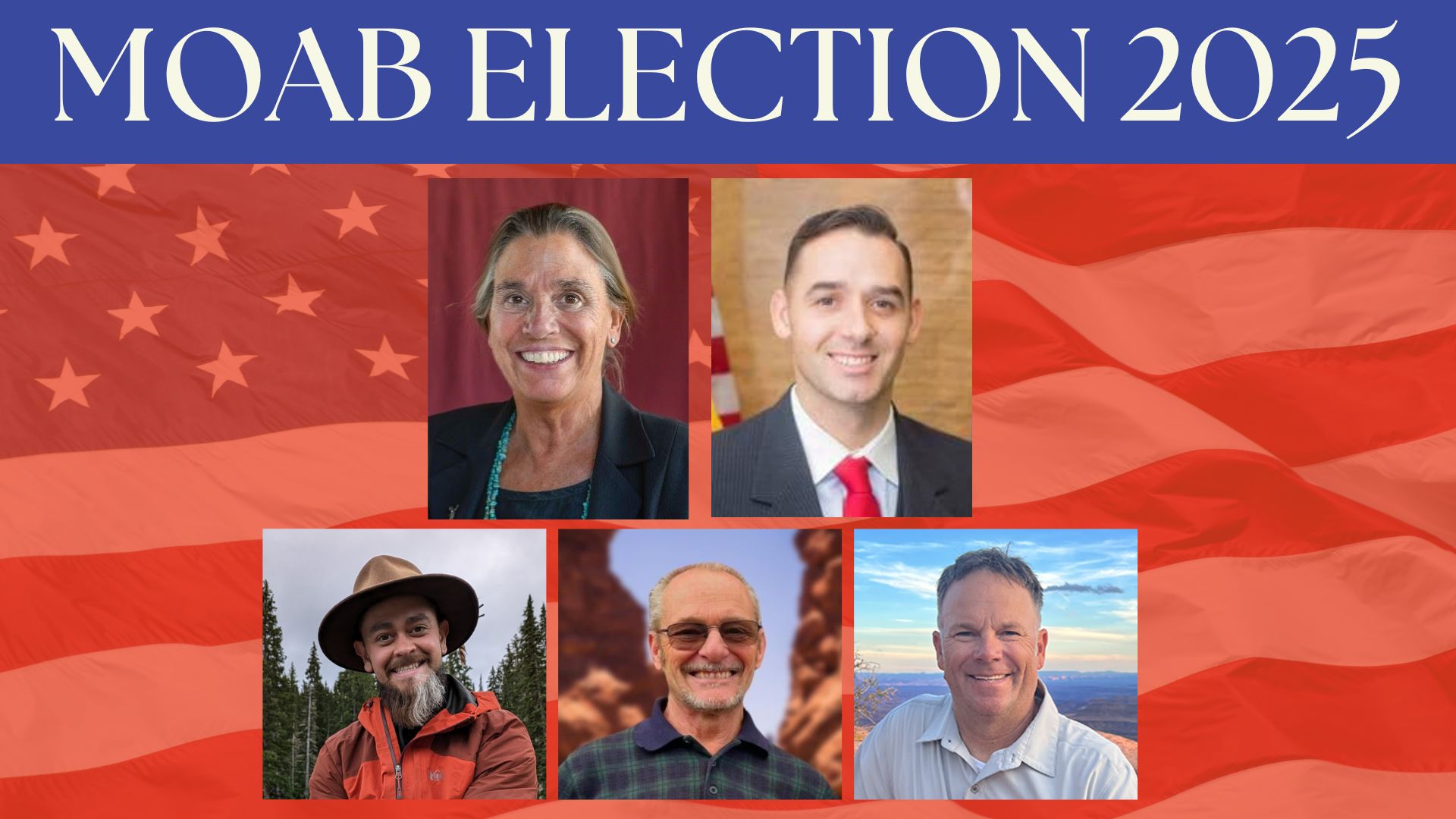Some information may be outdated.
While current COVID-19 infection rates, both statewide and locally, are sobering, city officials were happy to report a large boost in COVID-19 relief funding at the Oct. 27 Moab City Council meeting, where the city budget, the Moab City Police Department and the Walnut Lane affordable housing project were also discussed.
Moab City Hall remains closed to the public in light of high infection rates, though city staff continue to work. At the Oct. 27 meeting, City Manager Joel Linares stressed that high rates of COVID-19 infection across Utah are putting many hospitals and medical providers near their capacities. Linares implored Moab citizens to continue social distancing and wearing masks, and noted that enforcement efforts have increased and several people have been cited recently for improper mask-wearing.
In positive news, Moab will receive a third share of funding from the federal Coronavirus Aid, Relief, and Economic Security Act. In each of the two previous distributions, the amounts allotted to different localities were based on the population in each area. In the upcoming distribution, resort communities like Moab will receive a higher amount in recognition of the disproportionate impact suffered by tourist-based economies.
In each of the first two allotments, Moab received $156,710; in the upcoming distribution, the city will receive $854,561.
Mayor Emily Niehaus attributed the change to her own and other local leaders’ efforts to highlight the discrepancy to state leaders and other communities..
“Other leaders of cities and towns and counties recognized that it was not an equal distribution and actually advocated for us to receive additional CARES Act money,” she said.
Officials say the money may possibly be spent on COVID-19 mitigation measures, public safety, and improving the workspace in City Hall. Local leaders will hold a meeting this week to identify allowable uses and create a spending plan.
“It’s very exciting, and I’m very grateful,” said Niehaus.
The council also voted unanimously to extend a state of local emergency, with specific attention to the economic impact of COVID-19 on city restaurants. The resolution recognizes the loss of revenues sustained by restaurants because of capacity restrictions and allows for temporary outdoor seating arrangements in public areas adjacent to their establishments.
Budget
Finance Director Klint York brought more good news about city sales tax figures, reporting that the final revenue count reflecting sales tax collected in August came in higher than estimated: 115% of 2019 figures.
York also displayed an encouraging chart detailing the city’s Recreation Fund, which feeds the budget for the Moab Recreation and Aquatic Center. The MRAC, which generally operates at a loss, was temporarily closed earlier this year after the city deemed it too costly to staff and safely operate during the pandemic. The MRAC was reopened with reduced services and hours this summer.
York reported that, with a reduced spending plan and some new sources of revenue, the gap between MRAC revenue and expenditures is closing. City Manager Joel Linares was cautiously optimistic about the center’s budget, particularly if residents vote to pass Proposition 8, which would authorize the city to impose a sales tax to support recreation, arts and parks in Moab.
“We are dang close to getting recreation in the black if we get the Prop. 8 funding—including the MRAC,” Linares said.
Staffing changes at Moab Police Department
Moab City Police Chief Bret Edge announced staffing changes within the department, restructuring an administrative and a school resource officer position to instead support patrol and investigative work. The police department has been coping with a reduced staff since COVID-19 budget cuts slashed positions at several city departments, including the MPD.
Edge reported that the duties of departing Moab City Police Sergeant Jason Boots, who has accepted a new position in Sandy, will be distributed among other staff and the department would be looking for another patrol officer rather than hiring another administrative position to replace Boots.
Edge also noted that the department would no longer provide a resource officer to the Grand County School District, instead moving that officer to serve as a detective on the investigative team.
Edge also reported the formation of a use-of-force policy review task force, which was required in a June city proclamation made in response to Black Lives Matter protests locally and nationwide, sparked by the police killing of George Floyd.
The review group includes Edge along with representatives from Seekhaven Family Crisis and Resource Center, Four Corners Community Behavioral Health, the Moab Valley Multicultural Center, the Department of Workforce Services, Full Circle Intertribal Center and Moab PRIDE.
“My goal was to assemble a diverse group that would represent our population and I’m really proud of the group that we’ve assembled,” said Edge.
He is finalizing the department’s use-of-force policy, he said, and will send it to task force members for review within the next two weeks.
“This won’t be a quick, short term project—I don’t think anybody anticipated that it would be,” Edge said. “We’re digging in and we’re getting started and I’m super excited to be able to work with this group on that.”
Walnut Lane struggling to move forward
The City of Moab purchased property on Walnut Lane in 2018 with the intention of building and maintaining quality affordable housing. Progress is underway, but the project has been fraught with challenges. Existing trailer homes on the lot are in poor condition, and city staff have been constantly busy repairing and improving trailers and helping tenants find new housing when the trailers are too dilapidated to fix.
As temperatures drop, finding solutions for remaining tenants in inadequate housing is becoming more urgent. The issue has prompted staff to consider amending the master plan for the development to include modular or manufactured housing, in order to quickly replace uninhabitable units.
Staff and councilmembers are still looking for ways to adhere as closely as possible to their original vision while allowing for the realities of high costs, long timelines and the immediate needs of tenants.
Linares and Senior Projects Manager Kaitlin Myers have been working with Alex Buxton, a representative from Zions Bank, to understand the city’s financing options for the project.
Buxton attended the meeting and explained to the council that a sales tax bond will be the “best solution” to borrow money to fund Walnut Lane housing. In such a loan, the bond is “backed up” by the city’s sales tax revenues, but the city would not be required to pay back the loan using sales taxes.
For the Walnut Lane project, the proposed plan would be to pay back the loan using rent paid by tenants. Under the terms suggested by Buxton, the loan would be a 15 year bond for about $8.5 million. The city would be responsible for paying about $650,000 a year.
Councilmembers discussed the merits of modular housing and whether the project should remain at the large scale originally conceived or if it should be reduced or modified. Councilmembers expressed a commitment to quality, low-income housing in Moab.
“We knew that this was a low to very-low-income project and we wanted to make it as much of an asset to the city as we could,” said Councilmember Tawny Knuteson-Boyd. “Turning around and making it a trailer-for-trailer project is not what any of us envisioned.”
Land use code
The council unanimously approved adopting administrative procedures to provide transparency and community input when the city plans to change the use of a piece of city property. The amendment was prompted by a recent controversy regarding the Robin Groff Memorial Bike Skills Park along the Mill Creek Parkway. Opponents to that project said they felt blindsided and expected better communication from the city. Councilmember Mike Duncan noted that controversy won’t necessarily be avoided by legislatively changing the public engagement process.
“I would encourage us all to keep our political sensibilities and antennae tuned to when a public hearing is called for,” he said.
The Moab City Council meets second and fourth Tuesday of every month at the 7 p.m. and meetings are livestreamed on the Moab City Youtube channel. Schedules, agendas and opportunities for public comment can be found at www.moabcity.org
In our print edition, this article stated that the council passed an amendment to the city’s land-use code. However, the Moab City Council did not pass an amendment, but instead adopted “administrative procedures.” We regret the error.
City leaders successfully lobby for 5x increase in COVID relief funding
“Other leaders of cities and towns and counties recognized that it was not an equal distribution and actually advocated for us to receive additional CARES act money.”
– Emily Niehaus
Appreciate the coverage? Help keep local news alive.
Chip in to support the Moab Sun News.



